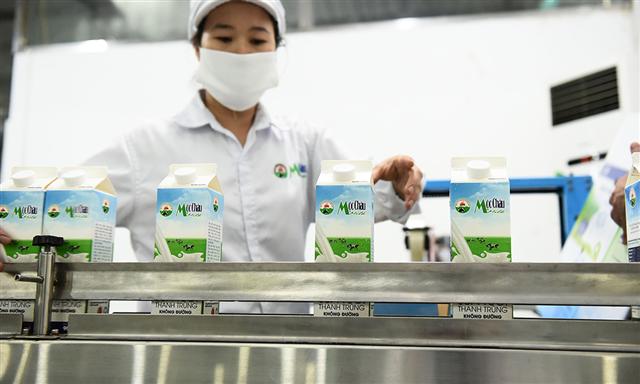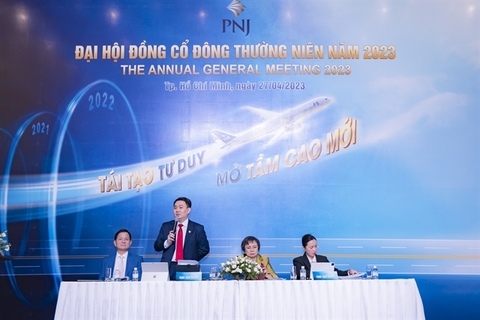Back to basics: Big Vietnamese listed firms want to feed masses
Back to basics: Big Vietnamese listed firms want to feed masses
Two of Vietnam’s biggest listed firms with earnings outside agriculture have shifted their attention to the stomach of the 90-million-strong market.

Both Vingroup and Mobile World JSC, which have made their fortune from real estate and electronics retailing, have begun eyeing up the huge demand for essential goods and are redirecting their investment into the planting and distributing of agro-products.
Earlier this month property developer Vingroup, whose chairman is currently Vietnam’s sole U.S. dollar billionaire with US$1.7 billion in assets according to Forbes magazine, sold the first batch of vegetables it has planted in specialized zones across Vietnam.
On October 1, VinEco, Vingroup’s agriculture subsidiary, introduced its first products at its Vinmart and Vinmart+ supermarket chain nationwide, six months after the group announced investment in the agricultural sector on a large scale.
After launch, VinEco will supply the market with an average yield of more than 30 metric tons of 14 different popular kinds of vegetables meeting GlobalGAP and VietGAP standards sourced from their farms every day.
GlobalGAP is an internationally-recognized set of farm standards dedicated to Good Agricultural Practices (GAP) that covers all aspects of feed manufacturing, from raw material sourcing to the finished feed products used on a farm.
VietGAP, or Vietnamese Good Agricultural Practices, is a similar set of standards for locally made agro-products set by the Vietnamese Ministry of Agriculture and Rural Development.
All kinds of vegetables are grown on the large-scale farms of VinEco in Tam Dao in the northern province of Vinh Phuc, Cu Chi in Ho Chi Minh City, and Long Thanh in the southern province of Dong Nai, using mechanization and automation technologies exported by Japan and Israel, which are the world's leading countries in agricultural research and development.
It is expected that from now until the end of 2015, VinEco will provide approximately 4,000 metric tons of fresh vegetables meeting GlobalGAP and VietGAP standards.
The establishment of VinEco in March aims at the production and supply of clean and safe agricultural products, the spillover effect of which will be to drive businesses, farmers and society toward clean agricultural practices, according to VinEco.
And Vingroup is not alone in beginning to venture into new territory, as electronics retailer Mobile World JSC, better known locally as The Gioi Di Dong, also announced its penetration into the agro-product market: distributing produce in an effective way as it is doing with electronics.
At a conference with potential investors last Friday, Nguyen Duc Tai, CEO and chairman of the board of directors of Mobile World, said the company will launch its own agro-product retailing chain, to be called Bach Hoa Xanh (Green Department Store), next month, aiming to establish a network of thousands of such convenient stores in the future.
The company will prioritize the responsiveness and price factor for their food stores while ensuring the quality to be equivalent to goods in traditional markets and supermarkets, according to news website Nhip Cau Dau Tu (Vietnam Investment Bridge).
Though Vietnamese consumers are expected to stick to traditional stores as their favorite shopping places, Bach Hoa Xanh will offer them a wider range of choices and take them less time to shop, Tai said.
The process of supplying retail chains is the same in terms of labor used as traditional markets, thus the quality will be equivalent and the firm will avoid unsafe sources by finding new suppliers who are stocking goods for local supermarkets, Tai said.
He also revealed that his retail chain will be modeled after Indonesia’s Alfamart Green with a test period of 12-18 months.
The company plans to open between 6,000 and 8,000 stores by 2020 to take up to 15 percent of the convenience food and grocery market by then, according to insideretail.asia.
Each store will have a footprint of 150 to 400 square meters, depending on its location, and will trade from 6:00 am to 9:00 pm, shorter hours than the convenient stores of other international brands, some of which are open 24/7, insideretail.asia reported.
The traditional businesses of the two Vietnamese firms are still working well, with VND717.2 billion ($32.2 million) and VND221.2 billion ($9.95 million) in post-tax profit by the end of June this year.
























